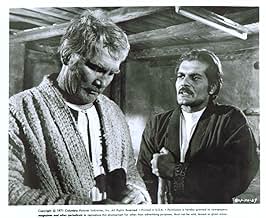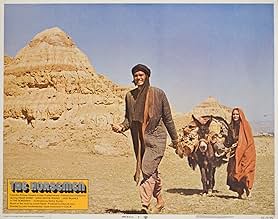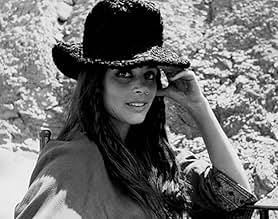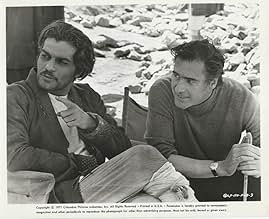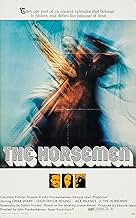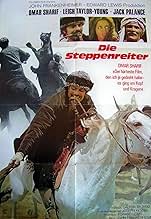CALIFICACIÓN DE IMDb
6.2/10
1.4 k
TU CALIFICACIÓN
Drama que describe la vida rural en el Afganistán contemporáneo y la afición del pueblo afgano a un antiguo deporte tradicional similar al polo a caballo.Drama que describe la vida rural en el Afganistán contemporáneo y la afición del pueblo afgano a un antiguo deporte tradicional similar al polo a caballo.Drama que describe la vida rural en el Afganistán contemporáneo y la afición del pueblo afgano a un antiguo deporte tradicional similar al polo a caballo.
- Dirección
- Guionistas
- Elenco
Salmaan Peerzada
- Salih
- (as Salmaan Peer)
Aziz Resham
- Bacha to Ghulam
- (as Aziz Resh)
Vida St. Romaine
- Gypsy Woman
- (as Vida St Romaine)
Florencio Amarilla
- Arabian Man
- (sin créditos)
Ishaq Bux
- Amjad Kahn
- (sin créditos)
Carlos Casaravilla
- Messenger
- (sin créditos)
- Dirección
- Guionistas
- Todo el elenco y el equipo
- Producción, taquilla y más en IMDbPro
Opiniones destacadas
Omar Sharif and Jack Palance may be the only names in this cast that most will recognize but the story based on an Afghan tale, set in Afghanistan before the Russian invasion, is a classic tale which lays out a great deal of Afghan culture during the period before the great disruption by the West. Afghanistan returned to the public eye after the post-911 invasion to depose the Taliban but the state of knowledge about these marvelous independent people who fought the British Empire to a standstill, still remains obscure. The game of buzgashi, a kind of polo for Weidman, was the core for many of the tribesmen. Its importance as an institution marking the status of tribes and individuals has no real counterpart in Western culture, and this is a tale of intrigue and self-learning, framed in a cultural setting we still have yet to understand.
Set in Afghanistan, John Frankenheimer's 'The Horsemen' is the story of a tribesman determined to rival his father at horsemanship
Uraz is sent by his father Tursen to win the traditional Royal Buzkashi on the field of Bagrami in the capital city of Kabul
Uraz on Jahil has to battle for control of a headless calf, carry it around a blue flag, and deposit it back in the 'Circle of Justice' thus signifying that he wins the king's pennant and remains as the master chapandaz of all Afghanistan During the tournament, opposing horsemen use their whips to urge on their horses and to hit the rider for the chance to snatch the heavy carcass
The motion picture turns around five well drawn characters: an angered son eaten up with vanity; a brave father who knew something worse than danger; a nomad woman whose touch defiles; a once loyal servant lusted for an 'unclean woman;' and a wager from the high passes of the East where 'men know how to forge fine weapons and use them well'
Uraz (Omar Sharif) deliberately chose to bribe his devoted servant with the magnificent white stallion in order to increase the already terrible dangers which he hopes to conquer
Zareh (Leigh-Taylor Young) urges her man to kill his high blood master to secure for herself his horse and his money
Tursen (Jack Palance) know nothing but evil legends about an impossible road taken by his embittered son His pain, remorse, and blood wept for a son lost through his fault
Mukhi (David de Keyser) forgets his humble and faithful world in the arms of the 'untouchable' woman who pushes him to murder the great prince
Hayatal (Peter Jeffrey) takes the challenge against 'the Prince Ram of the Valley' declaring openly to Uraz: 'What a one-horned ram can do, a one-legged chapandaz can do better!'
To understand 'The Horsemen' you must understand the rage, the beauty, and the tradition of a mountainous and landlocked country, isolated and left outside the mainstream of civilization
Written by Academy Award winner Dalton Trumbo (The Brave One, Best Original Screenplay, 1956) 'The Horsemen' is a passionate film for men only The film is a search that marks out the true concepts of honesty, integrity, loyalty, and trust
Uraz on Jahil has to battle for control of a headless calf, carry it around a blue flag, and deposit it back in the 'Circle of Justice' thus signifying that he wins the king's pennant and remains as the master chapandaz of all Afghanistan During the tournament, opposing horsemen use their whips to urge on their horses and to hit the rider for the chance to snatch the heavy carcass
The motion picture turns around five well drawn characters: an angered son eaten up with vanity; a brave father who knew something worse than danger; a nomad woman whose touch defiles; a once loyal servant lusted for an 'unclean woman;' and a wager from the high passes of the East where 'men know how to forge fine weapons and use them well'
Uraz (Omar Sharif) deliberately chose to bribe his devoted servant with the magnificent white stallion in order to increase the already terrible dangers which he hopes to conquer
Zareh (Leigh-Taylor Young) urges her man to kill his high blood master to secure for herself his horse and his money
Tursen (Jack Palance) know nothing but evil legends about an impossible road taken by his embittered son His pain, remorse, and blood wept for a son lost through his fault
Mukhi (David de Keyser) forgets his humble and faithful world in the arms of the 'untouchable' woman who pushes him to murder the great prince
Hayatal (Peter Jeffrey) takes the challenge against 'the Prince Ram of the Valley' declaring openly to Uraz: 'What a one-horned ram can do, a one-legged chapandaz can do better!'
To understand 'The Horsemen' you must understand the rage, the beauty, and the tradition of a mountainous and landlocked country, isolated and left outside the mainstream of civilization
Written by Academy Award winner Dalton Trumbo (The Brave One, Best Original Screenplay, 1956) 'The Horsemen' is a passionate film for men only The film is a search that marks out the true concepts of honesty, integrity, loyalty, and trust
Spectacular movie with exciting adventures , horse-riding and marvelous Oriental landscapes in the desolate , poor northern provinces of the mountainous feudal Sunni kingdom of Afghanistan . The story is suitably emblematic and talks upon a champion Afghan horseman named Uraz (Omar Sharif) who participates with his horse in an extraordinary national game of "buzkashi" dating back to the time of Genghis Khan . It is a fierce competition, played on the steppes of the northern Afghanistan , before the Soviet-engineered republican revolutions . His father named Tursen (Jack Palance) is too old and has got a crooked leg , while Uraz is even prouder and with a morbidly self-destructive , he needs to prove himself against deadly dangers . Later on , he undertakes a risked journey to regain the honor he has lost after his defeat in the ceremonial game . On the journeys he loses a leg , is confronted by his servant (David Keyser) and an untouchable girl (Leigh Taylor Young) who want murder him , besides a nomad (Peter Jeffrey) who struggles his scraggy one-horned sheep . Each meeting has within the seeds of his own meaning and predicament . The final spectacle , including Omar Sharif's double , of the horseman along with his stallion is breathtaking and overwhelming.
This stirring motion picture blends adventures , thrills , spectacular horse-game , emotions and is pretty entertaining . From the beginning to the end , the adventure and drama is continuous ; for that reason packs a lot of entertainment , though it balances ups and downs . With a cast of thousands and genuine Afghan extras , being shot on actual locations . Sets and production design are spellbound and the Oriental landscapes are mesmerizing . It is based on Joseph Kessel's 1967 novel, "Les Cavaliers" ("The Horsemen"), Kessel spent almost fifty years of his life roaming the world and being adapted by the black-listed Dalton Trumbo . The film began shooting using 65mm negative (Super Panavision), but during production, Columbia went through a change in management. The budgets for this and another 65mm production, "MacKenna's Gold," were cut, and both films were forced to switch over to 35mm anamorphic Panavisión ; however, both were released in 70mm, with the later-shot sections blown up. Colorful cinematography by Claude Renoir filmed on location in Afghanistan and Almeria , Spain , where in the 60s and early 70s were filmed a lot of Westerns .Two/three weeks into shooting, cinematographer James Wong Howe left the Project , due to disagreement with director John Frankenheimer over use of lens. Sensitive and fascinating musical score by George Delerue .
The motion picture is compellingly directed by John Frankenheimer . At the beginning he worked for TV and turned to the cinema industry with The Young Stranger (1957) . Disappointed his with first feature film experience he came back to his successful television career directing a total of 152 live television shows in the 50s. He took another opportunity to change to the big screen , collaborating with Burt Lancaster in The Young Savages (1961) and Birdman of Alcatraz(62) ending up becoming a successful director well-known by his skills with actors and expressing on movies his views on important social deeds and philosophical events and film-making some classics as ¨The Manchurian candidate¨, ¨Seven days of May¨ and ¨The Train¨ . The flick will appeal to Oriental adventure enthusiasts and Omar Sharif fans . Rating: Good , well worth watching
This stirring motion picture blends adventures , thrills , spectacular horse-game , emotions and is pretty entertaining . From the beginning to the end , the adventure and drama is continuous ; for that reason packs a lot of entertainment , though it balances ups and downs . With a cast of thousands and genuine Afghan extras , being shot on actual locations . Sets and production design are spellbound and the Oriental landscapes are mesmerizing . It is based on Joseph Kessel's 1967 novel, "Les Cavaliers" ("The Horsemen"), Kessel spent almost fifty years of his life roaming the world and being adapted by the black-listed Dalton Trumbo . The film began shooting using 65mm negative (Super Panavision), but during production, Columbia went through a change in management. The budgets for this and another 65mm production, "MacKenna's Gold," were cut, and both films were forced to switch over to 35mm anamorphic Panavisión ; however, both were released in 70mm, with the later-shot sections blown up. Colorful cinematography by Claude Renoir filmed on location in Afghanistan and Almeria , Spain , where in the 60s and early 70s were filmed a lot of Westerns .Two/three weeks into shooting, cinematographer James Wong Howe left the Project , due to disagreement with director John Frankenheimer over use of lens. Sensitive and fascinating musical score by George Delerue .
The motion picture is compellingly directed by John Frankenheimer . At the beginning he worked for TV and turned to the cinema industry with The Young Stranger (1957) . Disappointed his with first feature film experience he came back to his successful television career directing a total of 152 live television shows in the 50s. He took another opportunity to change to the big screen , collaborating with Burt Lancaster in The Young Savages (1961) and Birdman of Alcatraz(62) ending up becoming a successful director well-known by his skills with actors and expressing on movies his views on important social deeds and philosophical events and film-making some classics as ¨The Manchurian candidate¨, ¨Seven days of May¨ and ¨The Train¨ . The flick will appeal to Oriental adventure enthusiasts and Omar Sharif fans . Rating: Good , well worth watching
The Horsemen could have been better, and I was expecting to be bowled over considering the talent there is. It's still however a very decent and interesting film, with its best assets being excellent.
When it comes to how The Horsemen looks, it's in this area where the film excels the most. The magnificent Afghanistan scenery, with its breath-taking sunsets and serene mountain views for examples, are done justice by the colourfully sweeping but also gritty photography, with its frequent use of beautiful aerial shots. The lushly romantic and (at other points) also appropriately brassy music score compliments the mood perfectly and the buzkashi scenes are relentlessly brutal(a warning this is not for the faint-hearted) as well as very compelling.
John Frankenheimer's direction, while not the best he has ever done is restrained while not undermining any tension when it's needed. The characters are interesting and the interplay between them often is quite real, these are not 'likeable' characters by all means(never were they meant to be) but the development and interplay was well done it was easy to care for them. The acting is well above average on the most, with a more restrained than usual but very commanding, eerie and actually also very moving performance of Jack Palance faring best. His make-up is believable too. Leigh Taylor-Young plays her role very sympathetically.
For all these good qualities however, The Horsemen has a few failings. One problem being the script, which has some naturally contemplative and poetic moments but also too many moments of silliness and awkwardness. A good atmosphere is maintained throughout and much of the film is very passionate and emotionally affecting, but the story for my tastes did drag sometimes and felt a little choppy structurally. Omar Sharif(from personal opinion) has also given better performances, it's certainly better than his stiff performance is the badly miscalculated Che Guevara biopic Che(which coincidentally also had Palance in one of his worst performances), but the performance here is a bit one-note and of one expression, Sharif spends most of the time looking very grim and not much of anything else.
All in all, a decent film with some truly excellent things, but also could have been great if other important components were done stronger. 6.5/10 Bethany Cox
When it comes to how The Horsemen looks, it's in this area where the film excels the most. The magnificent Afghanistan scenery, with its breath-taking sunsets and serene mountain views for examples, are done justice by the colourfully sweeping but also gritty photography, with its frequent use of beautiful aerial shots. The lushly romantic and (at other points) also appropriately brassy music score compliments the mood perfectly and the buzkashi scenes are relentlessly brutal(a warning this is not for the faint-hearted) as well as very compelling.
John Frankenheimer's direction, while not the best he has ever done is restrained while not undermining any tension when it's needed. The characters are interesting and the interplay between them often is quite real, these are not 'likeable' characters by all means(never were they meant to be) but the development and interplay was well done it was easy to care for them. The acting is well above average on the most, with a more restrained than usual but very commanding, eerie and actually also very moving performance of Jack Palance faring best. His make-up is believable too. Leigh Taylor-Young plays her role very sympathetically.
For all these good qualities however, The Horsemen has a few failings. One problem being the script, which has some naturally contemplative and poetic moments but also too many moments of silliness and awkwardness. A good atmosphere is maintained throughout and much of the film is very passionate and emotionally affecting, but the story for my tastes did drag sometimes and felt a little choppy structurally. Omar Sharif(from personal opinion) has also given better performances, it's certainly better than his stiff performance is the badly miscalculated Che Guevara biopic Che(which coincidentally also had Palance in one of his worst performances), but the performance here is a bit one-note and of one expression, Sharif spends most of the time looking very grim and not much of anything else.
All in all, a decent film with some truly excellent things, but also could have been great if other important components were done stronger. 6.5/10 Bethany Cox
There is so much of interest in this compelling film, set in Afghanistan. Based on the book by Joseph Kessells, a writer of rare insight.
Centered around the ancient game of Buzkashi, played on horseback, and only in the three northern provinces of Mazar-i-Sharif, Maimana and Kataghan. [The game had it's origin in a training routine instituted by Ghengiz Khan, which both conditioned his men for warfare and provided a means of feeding his army. A very large circle was formed by his warriors and as the circle closed no animal was permitted to escape.]
There are some terrific scenes of the first "Royal Buzkashi" played on Bagrami Plain, just outside Kabul, which had been decreed by the king. Also some great footage of the country, depicting the beautiful and varied terrain encountered as Uroz makes the self-imposed and dangerous journey back to his home province in the North.
The interplay of all the characters is an education in understanding the powerful role human emotion and upbringing play in all our lives, as both Tursen(the father) and Uroz(the son) attempt to come to terms with their own harsh anger and pride. The consequences spill over and embroil other individuals in the story. The story also gives some insight into the different way of thinking engendered by the cultural mix of religion,relatively isolated living, and living in a harsh environment where survival can be pretty raw.
Contrast is drawn by the mix of ancient and modern. One such scene has Tursen (Jack Palance),who as Head of Osman Bey's stable is addressing the chopendoz,(players of Buzkashi), pauses to look upwards at a jetliner passing overhead whilst he stands on "The Roof of the World". Another takes place in the modern hospital in Kabul.
Both Palance & Sharif give of their finest, very well supported by a great character cast.
A dramatic part of the story unfolds in the Bamian Valley, where Uroz gambles & loses the very thing he later realise he loves and wants back. Historically this part of the film contains important footage of the giant Budhas that were carved into the cliffside, until deliberately destroyed by Talliban militia.
All in all, an excellent and enjoyable film and I am surprised it has not been shown on Television or re-issued on disc, as the world focussed on that area just a short time ago.
Centered around the ancient game of Buzkashi, played on horseback, and only in the three northern provinces of Mazar-i-Sharif, Maimana and Kataghan. [The game had it's origin in a training routine instituted by Ghengiz Khan, which both conditioned his men for warfare and provided a means of feeding his army. A very large circle was formed by his warriors and as the circle closed no animal was permitted to escape.]
There are some terrific scenes of the first "Royal Buzkashi" played on Bagrami Plain, just outside Kabul, which had been decreed by the king. Also some great footage of the country, depicting the beautiful and varied terrain encountered as Uroz makes the self-imposed and dangerous journey back to his home province in the North.
The interplay of all the characters is an education in understanding the powerful role human emotion and upbringing play in all our lives, as both Tursen(the father) and Uroz(the son) attempt to come to terms with their own harsh anger and pride. The consequences spill over and embroil other individuals in the story. The story also gives some insight into the different way of thinking engendered by the cultural mix of religion,relatively isolated living, and living in a harsh environment where survival can be pretty raw.
Contrast is drawn by the mix of ancient and modern. One such scene has Tursen (Jack Palance),who as Head of Osman Bey's stable is addressing the chopendoz,(players of Buzkashi), pauses to look upwards at a jetliner passing overhead whilst he stands on "The Roof of the World". Another takes place in the modern hospital in Kabul.
Both Palance & Sharif give of their finest, very well supported by a great character cast.
A dramatic part of the story unfolds in the Bamian Valley, where Uroz gambles & loses the very thing he later realise he loves and wants back. Historically this part of the film contains important footage of the giant Budhas that were carved into the cliffside, until deliberately destroyed by Talliban militia.
All in all, an excellent and enjoyable film and I am surprised it has not been shown on Television or re-issued on disc, as the world focussed on that area just a short time ago.
¿Sabías que…?
- TriviaThe film began shooting using 65mm negative (Super Panavision), but during production Columbia Pictures went through a change in management. The budgets for this and another 65mm production, El oro de Mackenna (1969), were cut and both films were forced to switch over to 35mm anamorphic Panavision. However, both were released in 70mm, with the later-shot sections blown up. In later years, the mix-and-match formats made restoration of the films more time consuming and expensive than if they'd been shot entirely in 65mm, and they were preserved in 35mm only.
- ErroresWhen Tursen (Jack Palance) has a flashback to one of his past victories, one can tell that he is swinging a phony, lightweight, stuffed goat carcass around when his horse jumps up on the mud hut.
- Citas
District Chief: What demon has possessed you to mock these good people with that piece of dog-bait?
Selecciones populares
Inicia sesión para calificar y agrega a la lista de videos para obtener recomendaciones personalizadas
- How long is The Horsemen?Con tecnología de Alexa
Detalles
- Fecha de lanzamiento
- País de origen
- Sitio oficial
- Idioma
- También se conoce como
- Konjanici
- Locaciones de filmación
- Afghanistan(Exterior)
- Productoras
- Ver más créditos de la compañía en IMDbPro
Taquilla
- Presupuesto
- USD 6,000,000 (estimado)
- Tiempo de ejecución1 hora 49 minutos
- Mezcla de sonido
- Relación de aspecto
- 2.35 : 1
Contribuir a esta página
Sugiere una edición o agrega el contenido que falta



